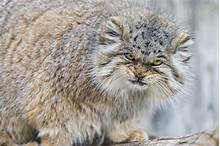Can You Have a Pallas Cat as a Pet?
The Pallas's cat, also known as the manul, is a small, wild cat native to the steppes and deserts of Central Asia. With its distinctive flat face, thick fur, and piercing green eyes, the Pallas's cat has captured the attention of many cat enthusiasts. However, due to its wild nature and specific needs, owning a Pallas's cat as a pet is not recommended.

Legality and Availability
1. Legal Restrictions: In many countries, it is illegal to keep wild animals as pets, including the Pallas's cat. Laws vary by region, so it's essential to research local regulations before considering owning one.
2. Availability: Pallas's cats are not readily available in the pet trade. Even if you find a breeder or seller, the cost of acquiring one can be prohibitively high.
Wild Instincts and Behavior
1. Untamed Nature: Pallas's cats are wild animals with strong instincts. They are not domesticated like other common house cats and may exhibit unpredictable behavior.
2. Solitary and Nocturnal: Pallas's cats are solitary animals that prefer to be alone. They are also nocturnal, meaning they are most active at night, which may not align with a typical pet owner's lifestyle.
3. Specialized Diet: Pallas's cats have a specialized diet consisting of small rodents, birds, and insects. Providing a suitable diet in captivity can be challenging.
Health and Care
1. Veterinary Care: Pallas's cats require specialized veterinary care, as their unique physiology and behavior differ from domestic cats. Finding a veterinarian experienced in treating wild cats can be difficult.
2. Specific Environment: Pallas's cats need a spacious and enriched environment that mimics their natural habitat. Creating such an environment in captivity can be challenging and expensive.
3. Risk of Disease: Pallas's cats can carry diseases and parasites that can be transmitted to humans. Proper precautions and regular health checks are essential to minimize the risk of infection.
Conservation Concerns
1. Endangered Species: Pallas's cats are classified as a vulnerable species by the International Union for Conservation of Nature (IUCN). Keeping them as pets contributes to the demand for wild-caught individuals, potentially exacerbating their conservation status.
2. Habitat Destruction: The wild habitats of Pallas's cats are threatened by human activities, such as agriculture, mining, and urbanization. Keeping them as pets does not address the root cause of their population decline.
3. Ethical Considerations: Owning a Pallas's cat as a pet raises ethical concerns about the welfare of the animal and the potential impact on wild populations. Many animal welfare organizations advocate for the conservation of wild animals in their natural habitats.
In conclusion, while the Pallas's cat may be a captivating creature, it is not suitable as a pet. Their wild nature, specialized needs, and conservation concerns make them unsuitable for domestication. Instead of owning a Pallas's cat, consider supporting conservation efforts and admiring these magnificent creatures in their natural habitats.
Declaration: All article resources on this website, unless otherwise specified or labeled, are collected from online resources. If the content on this website infringes on the legitimate rights and interests of the original author, you can contact this website to delete it.





